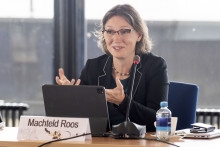Why did the Executive Board decide to issue this statement following the revelations from The Voice?
Roos: 'It is a very important theme that has been on our agenda for some time and I think we all had the same thoughts when the revelations came out: incredibly intense. We are a people-first university and we get involved in social discussions. We should not be naive. We know that sexual transgressive behavior unfortunately occurs everywhere, including at the UT. Therefore, see our message not only as a statement, but above all as a call. Together we create a healthy working and study climate. As Board we radiate this and we are in conversation with the community about this. We hope that everyone will openly discuss this topic with each other.'
The statement says that sexually transgressive behavior occurs at the UT. Is that an assumption or is it demonstrated by examples?
'Sexual transgression unfortunately also occurs at the UT. This is unacceptable and we act accordingly. This concerns signals, reports and official complaints. Our social workers, such as confidential counsellors and the ombuds officer, play an important role in this and hopefully this ensures that no one feels alone. We will continue to put this on the agenda.'
What will that look like in concrete terms?
'A campaign about sexually transgressive behavior: how are we going to ensure a safe working environment together? Not everyone thinks the same way, so it's good to keep talking about it. It has to be important for everyone at the UT. It's good to listen to each other. What I also like is that students take it seriously. I know that student associations are working with student confidants to make this topic open for discussion. I also recommend the Mindlab theater performance. It inspires to think together about themes related to integrity.'
A zero tolerance policy applies at the UT. John de Mol also spoke about zero tolerance policies. What does that mean?
'It depends on the situation. It starts with addressing the situation, but can also be an official warning, suspension or dismissal. The role of those involved is important and we work very carefully in this regard. Reporting to the police is always advised and, if necessary, supported. It is even more important to be ahead of all this, which is why we call on everyone to be open and to talk to each other about this.'
One similarity between the media world and universities is the positions of authority. You write that the university should organize itself in such a way that abuse of authority cannot occur. How do you do that?
'A hierarchy will always exist in organizations, so we need to create a safe culture. This means that everyone has the right to be heard, regardless of rank or position. It helps if people in positions of power are recognized and acknowledged. It also helps if people are invited to speak up about what a safe work and study environment means to them. At all levels, people need to be accountable for their behavior. This can be difficult, but let it be clear that I see this as normal and an important part of a healthy organizational culture. So let's help each other do that.'
If a UT employee or student is a victim of aggression or abuse, what do you recommend them to do?
'Don't keep walking around with it. Find someone you can confide in and tell your story, no matter how difficult that may feel. A confidant, manager, ombudsperson or someone else you trust. Our integrity website has signposts for students, staff and PhDs. These can help. And just as important: if you see something somewhere that you think is not right, make it discussable. Only together can we ensure that sexually harmful behavior stops.'






